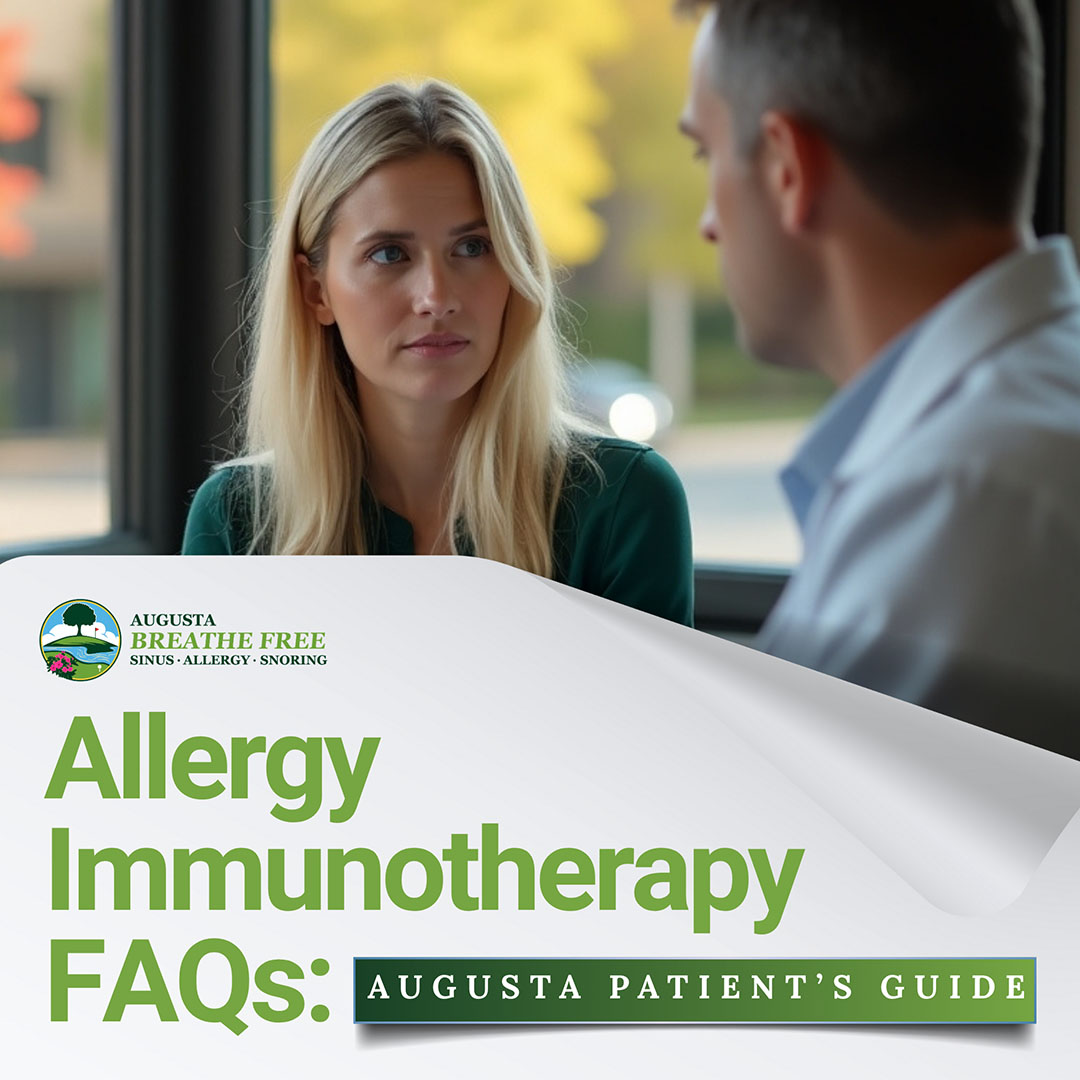🌿 Allergy Immunotherapy FAQs:
Augusta Patient’s Guide

Seasonal allergies can be relentless in Augusta, with spring pollen, summer grasses, and fall ragweed often leaving residents with congestion, sneezing, and sinus pressure that seem never-ending. While medications like antihistamines and nasal sprays can help manage symptoms, they often only offer temporary relief.
That’s where allergy immunotherapy — also known as allergy shots or drops — can make a long-term difference. At Augusta Breathe Free Sinus, Allergy & Snoring, we provide customized immunotherapy treatments designed to help retrain your immune system for lasting relief. Below are answers to some of the most common patient questions.
💉 What Is Allergy Immunotherapy?
Allergy immunotherapy gradually reduces your body’s sensitivity to allergens. Unlike medications that simply mask symptoms, this treatment addresses the root cause of your allergic response.
Two main types of immunotherapy are available:
- Allergy shots: Injections administered in the clinic
- Allergy drops: Liquid doses placed under the tongue at home (after initial supervision in the clinic)
Both methods introduce small, controlled amounts of allergens like pollen, pet dander, or dust mites to help your immune system build tolerance over time.
⏱️ How Long Does Treatment Take?
Allergy immunotherapy requires consistency and patience, but it offers long-term benefits that often make the commitment worthwhile.
- Build-up phase: Weekly injections or daily drops as doses gradually increase
- Maintenance phase: Continued treatment for 3–5 years at a steady level
Many patients notice improvement within 6–12 months, including fewer symptoms and reduced dependence on allergy medications.
🩺 Is Allergy Immunotherapy Safe?
Yes. Immunotherapy has been used for decades and is FDA-approved for safety and efficacy. The most common side effects include:
- Mild redness or itching at the injection site
- Temporary mouth or throat irritation (for drops)
Allergy shots are always given under clinical supervision to ensure patient safe
👨👩👧 Who Is a Good Candidate?
You may be a good candidate for immunotherapy if you:
- Experience persistent or seasonal allergies
- Depend on daily medication but still have symptoms
- Have allergic asthma or recurring sinus infections caused by allergies
- Want a long-term treatment solution rather than temporary symptom control
Children as young as five years old may also qualify, making this a family-friendly treatment option.
🌳 What Allergens in Augusta Commonly Trigger Symptoms?
Augusta’s climate and vegetation contribute to a wide range of allergy triggers throughout the year. Common local allergens include:
- Tree pollen: Oak, pine, birch (spring)
- Grass pollen: Especially high in late spring and summer
- Ragweed pollen: Peaks during the fall
- Mold spores: Thrive in Augusta’s humid air and fallen leaves
- Indoor allergens: Dust mites and pet dander
These allergens often overlap seasonally, which is why long-term desensitization through immunotherapy can be especially beneficial for Augusta residents.
🏥 Why Choose Augusta Breathe Free for Allergy Immunotherapy?
Our ENT specialists focus on personalized care and precision-based allergy management. At Augusta Breathe Free, we provide:
- Comprehensive allergy testing to identify your exact triggers
- Customized treatment plans built around your lifestyle
- Options for allergy shots or drops depending on your needs
- Continuous support and follow-ups to ensure steady progress
Our goal is to help patients achieve long-term relief and better breathing — without relying solely on temporary medications.
🌤️ Take Control of Your Allergies
Living in Augusta doesn’t have to mean struggling through allergy seasons year after year. With allergy immunotherapy, you can reduce your immune system’s overreaction to pollen, dust, and mold, leading to fewer symptoms and greater comfort.
At Augusta Breathe Free, our team is here to guide you through testing, treatment, and every step toward lasting allergy relief.
📞 Schedule your allergy consultation today and take the first step toward long-term symptom control and better sinus health.
Disclaimer: This content is for informational purposes only and is not a substitute for professional medical advice, diagnosis, or treatment. Always consult your physician or a qualified healthcare provider with any questions about your health.



